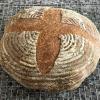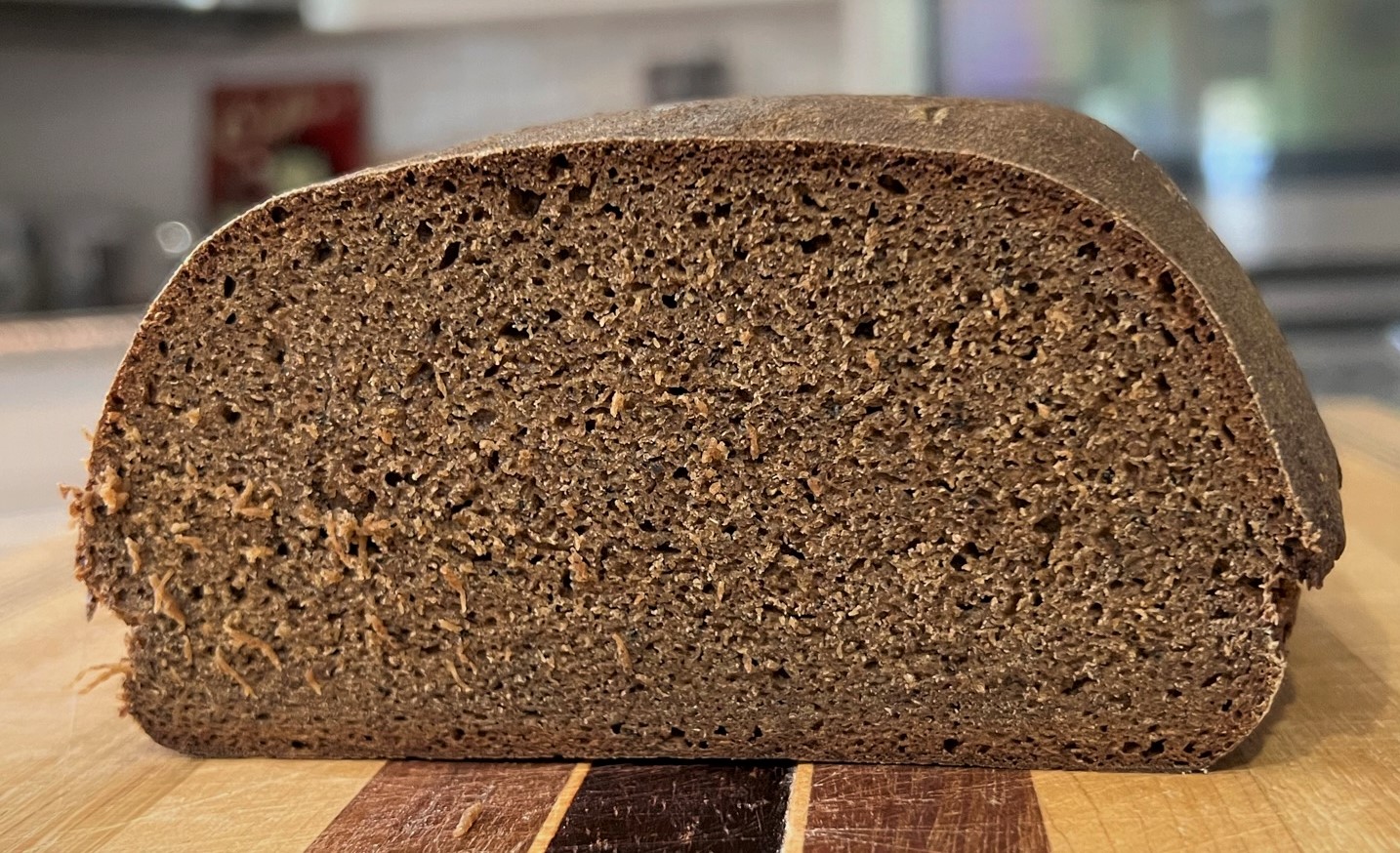
Black Rye Bread (Lithuanian) -- My Bake
Having found a good source for solod (the fermented red rye malt), I have been baking several different rye loaves recently. This one is a Lithuanian bread based on a recipe from Stanley Ginsberg (http://theryebaker.com/black-rye-breadjuoda-rugine-duona-lithuania/).
As I described in another post, this dough did not behave well for me when I tried mixing it with a stand mixer (per Stan's recipe), but mixing by hand works perfectly fine (along the lines of what Rus Brot does with a Borodinsky dough). So far I have used a mix of medium rye and dark rye flour, but the next time I might go with all dark rye flour.
Here is a top view of today's bake.
This loaf is going to a friend, so I will not have a photo of the crumb, but here is one from my preceding bake of this bread.



Comments
I baked this one too. Mine spread more (I used fresh milled spelt instead of bread flour). For me, it was a bit too much of a pickle sour flavour. It was good with gouda + prosciutto. Did yours turn out more balanced? How did you feel about the density of your crumb?
Not sure that 50 grams of bread flour really makes much difference with this recipe, given all the rye. For shaping, I first made the dough into a round and then rolled it gently into a cylindrical shape and then a bit into a batard-like torpedo. Then I put the shaped dough into a cloth-lined loaf pan. That kept the dough from spreading. Baked on a stone.
As for the flavor, all of these rye loaves have a distinctive flavor, which I suspect comes from the scald. I have eaten slices plain, toasted, with cream cheese, and with butter. I will have to try some cheddar or gouda as well as a meat or fish (I got some salmon for the next bake). It is a versatile bread in that respect.
I saw the pan edge on the crumb shot. Smart.
FYI As for salmon, the bread spices in the Franconia rye baker loaf seemed to work well with smoked salmon. It wasn't so sour.
Forgot to answer your question about the density of the crumb. Although dense in a visual sense, this crumb is springy and not at all difficult to bite through.
Spreading is mostly about hydration. The dough shouldn't be too soft. Also the first few minutes of baking should be very hot, and dough should spring quickly, and the outside needs to set, so it also prevent spreading.
So depending on the flour, you need to adjust the hydration in the final dough. If you realize you missed the mark, you can knead in some flour when shaping to stiffen it up a little.
Ilya, as you correctly point out, this bread benefits from an initial period of high temperature. The recipe calls for fifteen minutes at 445 F followed by a reduction to 390 F for the remainder of the bake.
Looks good, must be very tasty!
It smells nice, and I will eventually find out from my friend what the reaction is to the bread (including the taste). These rye breads are pretty neat to make and eat.
That’s a beautiful well baked loaf that your friend will really appreciate Ted. Really beautiful sheen to the crust.
Benny
You need to put one of these rye breads on your to-do list, Benny. As for the sheen, I can thank Ilya and Lance (aka Albacore) for their suggestions. I am still working on getting the cornstarch gelatin to the thickness that I am after.
A beautiful wonderful crumb!
Would be excellent open faced with "potato cheese" or egg salad spread decorated with chive ringlets or ground sweet paprika.
Thanks, Mini Oven. This is a versatile bread and really does pair well with a variety of toppings (and is perfectly fine by itself too).
that's one mammoth, marvelous bread to give away to a lucky friend. Beautiful & inspirational bake.
The loaf weighed 899 grams, so perhaps it looks bigger in the photo. Thanks for your compliments (and perhaps you will be inspired to have a go at this bread).
I speak for everyone when I say we'd love to see this featured on the community bake. Please feel free to post it on there as well. What a perfect looking rye crumb. Bet it tastes every bit as delicious as it looks.
Thanks, Abe. A couple of weeks before you posted for the Community Bake two of our neighbors gave me a commercial loaf of Lithuanian bread (i.e., they purchased it rather than baked it). I liked the flavor so much that I hunted down a recipe for Lithuanian bread, which eventually led me to read Ilya's post on the Borodinsky bread, and of course I had to make that too (see a separate blog post by me for the 1940 version and another blog post for the Borodinsky Supreme). Now I have three bags of solod waiting to be used for future bakes of these wonderful breads
If you want to reference other rye bakes (including mine but others too) rather than re-posting there, perhaps that would work as well. Those CB threads get really long.